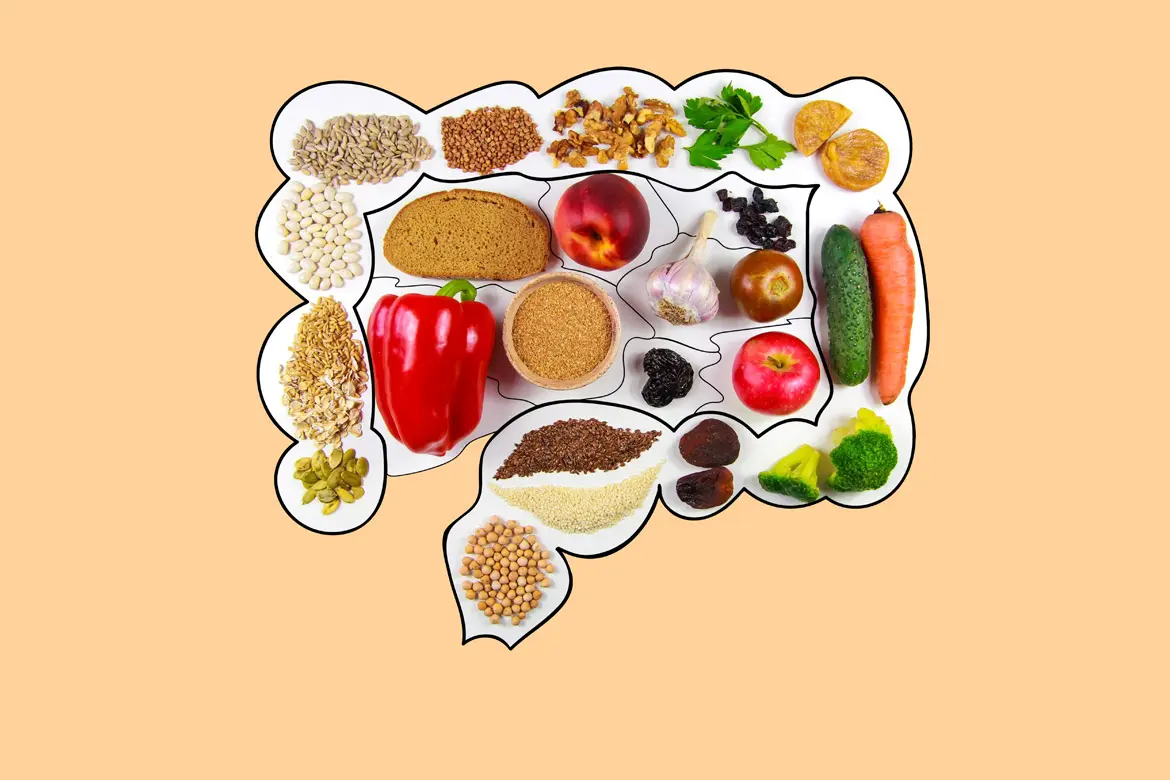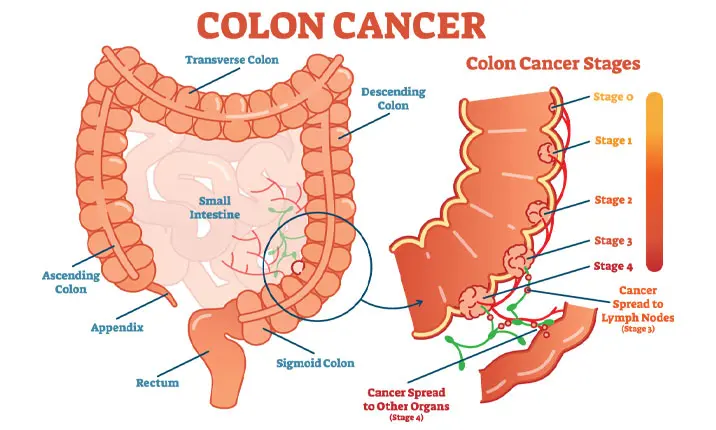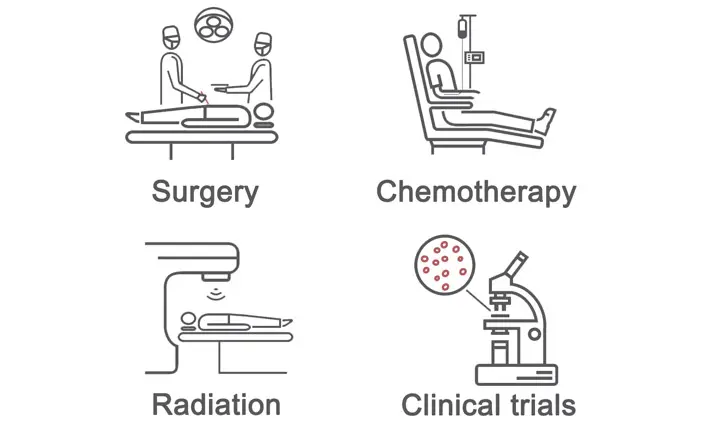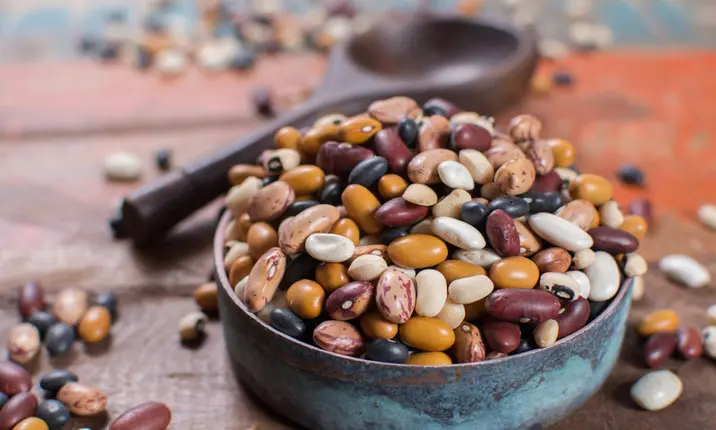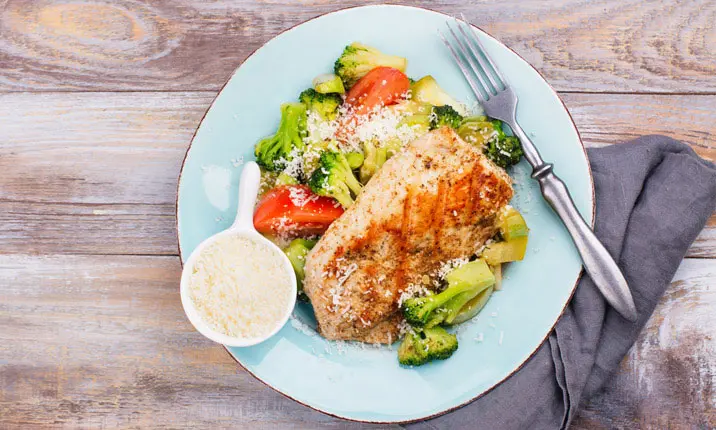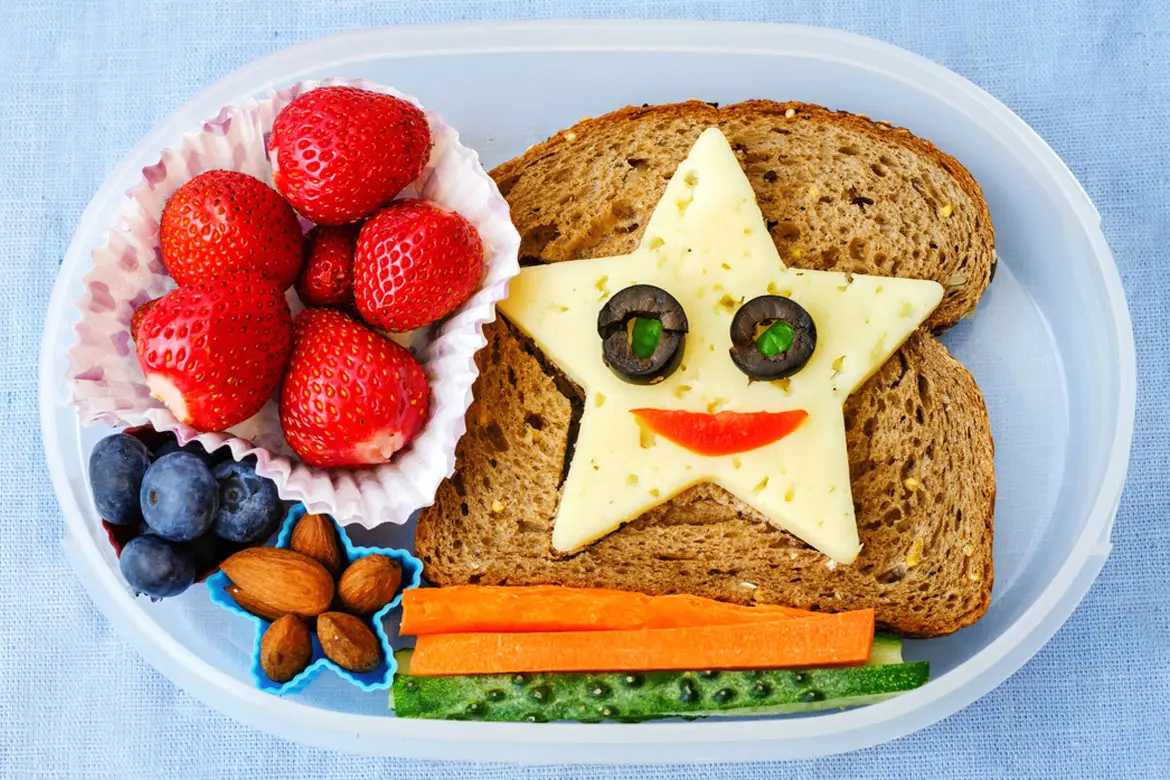What is colon cancer?
Colon cancer refers to cancer of your large intestine, which is the long, muscular tube connecting your small intestine to your rectum. Your colon plays an essential role in your digestive system by processing waste through elimination from your body. When the cells lining your large intestine develop abnormally, this is referred to as colon cancer. Colon cancer is very common. The World Health Organisation reported 1.8 million cases of colon cancer in 2018 alone.
Colon cancer treatments
If you develop colon cancer, your doctor will assess your individual situation and the stage your cancer has reached to determine an appropriate treatment plan. Typical cancer treatments include:
- Surgery to remove the cancerous tissue or tumours. If the disease has spread, your surgeon may need to remove an entire section of your intestine and reattach the healthy sections.
- Chemotherapy, which helps eliminate any remaining abnormalities and prevent the cancer from spreading or returning.
- Radiation if the tumour is large or aggressive.
- Participation in clinical trials of new drugs or treatments, if your doctor recommends it.
The role of your diet
You should always follow your doctor's advice when undergoing treatment for any illness. Cancer is a serious and life-threatening condition and your oncologist will put together the best treatment plan for your individual situation. However, there are things you can do to improve your overall health, including making changes to your diet, which can help you fight the disease. Research has shown that a poor diet is a major risk factor for colon cancer. Luckily, there are plenty of superfoods that you can include in your diet to help combat the disease.
Superfoods for fighting colon cancer
Beans and legumes
Beans and legumes are hailed as superfoods in the fight against colon cancer. Black beans in particular raise levels of specific fatty acids that protect against the growth of cancer cells.
Berries
Berries are full of antioxidants and phytonutrients that are good for your health. Black raspberries contain very high levels of anthocyanins, which slow the development of malignant cells.
Carrots
Carrots are full of beta-carotene, which researchers believe slow the growth of abnormal cells. There is also evidence to suggest that carrots contain an abundance of nutrients and vitamins that protect your body against many types of cancer.
Coffee
Higher levels of coffee consumption are associated with lower recurrence rate. One study showed that a cup of coffee each day reduces mortality rate by as much as 20% for patients with stage 3 colorectal cancer.
Cruciferous vegetables
Broccoli and other cruciferous vegetables such as kale, cabbage and cauliflower have cancer-fighting properties. Broccoli in particular contains a large amount of sulfurophane, which minimises the risk of cancer and assists your body's enzymes in fighting disease.
Nuts
A diet rich in nuts is also associated with reduced rate of cancer recurrence and death in patients with stage 3 cancer.
Spinach
Spinach is another powerful green vegetable rich in folate and fibre to promote overall health and wellness. It contains carotenoids, which studies show to reduce the risk of colon cancer.
What are the foods to avoid in a colon cancer diet?
There are plenty of superfoods you can include in your diet to fight colon cancer. But what foods should you avoid in a colon cancer diet?
Foods with high glycaemic load
Food with high glycaemic load (e.g. white rice, noodle, cake, sugar) worsens survival in patients who are overweight.
Studies have found a clear and direct link between foods with a high glycaemic load and colon cancer. This is because these foods trigger a greater tendency toward insulin resistance. Insulin and its associated hormones are thought to increase cancer risk.
Glycaemic load is a measure that takes into account the amount of carbohydrate in a portion of food together with how quickly it raises blood sugar levels. A high glycaemic load refers to foods with a value of 20 and above.
Red meat
Red meat specifically has been related to an increased risk of colon cancer up to about 2 times. Limit your red meat intake and swap it for fish or lean white meat instead.
Red meat specifically has been related to an increased risk of colon cancer up to about 2 times. This includes beef, lamb and mutton, pork, veal, venison and goat.
There are several potential reasons to explain how red meat may cause colon cancer. Red meat contains a compound called haem, which gives its red colour. This compound promotes the formation of N-nitroso compounds that can potentially cause cancer. Additionally, when red meat is cooked at high temperatures, certain compounds are produced that can cause colon cancer in people who have a genetic predisposition.
Limit your red meat intake and swap it for fish or lean white meat instead.
Processed meats
Processed meats often contain chemicals and preservatives that research suggests may be carcinogenic. A carcinogen is an agent with the capacity to cause cancer. They work by interacting with a cell's DNA and inducing changes to it (mutations).
Processed meat refers to meat that has been preserved by curing, salting or adding preservatives. This includes ham, sausage, bacon, deli meats such as salami, canned meat such as corned beef and sliced luncheon meats, including those made from chicken and turkey.
Processed meats have compounds called nitrites and nitrates that are added as preservatives, which are thought to cause cancer. Processing also changes the nature of the meat, which may play a role to its link to cancer.
The majority of your diet should be made up of fresh food.
Alcohol
Alcohol is linked to many diseases including cancer.
Moderate to heavy alcohol consumption is associated with 1.2- to 1.5-fold increased risk of colon cancers compared with no alcohol consumption.
There are several ways that alcohol is thought to increase cancer risk. Certain compounds are produced when alcohol is broken down in the body. Some of these compounds can damage the DNA and cause cancer. Alcohol also impairs the body’s ability to break down and absorb a variety of nutrients that may be associated with cancer risk.
Keep alcohol intake low or cut it out completely.
A balanced diet is key
The most important thing to remember is that a healthy, balanced diet will give you the best chance of maintaining your health and fighting illness or disease. Include plenty of fruits, vegetables, whole grains and lean protein in your diet and minimise your intake of simple carbohydrates and processed food. Some recipe ideas that include cancer-fighting superfoods are:
- Stir-fry vegetables (specifically broccoli, spinach, tomatoes and carrots) with garlic
- Vegetarian black bean chilli with plenty of garlic, spices and wholegrains
- Steamed rice with vegetables and beans
- Berries/fruit salad with strawberries, blueberries, raspberries and pomegranate seeds
- Wholegrain wraps with vegetables or salad and lean protein
When should you talk to your doctor?
If you are undergoing cancer treatment, it is vital to speak with your doctor before making any significant changes to your diet or lifestyle. If you want help with your diet, they will be able to refer you to a dietitian to tailor an eating plan based on your needs. Maintaining your overall health is always important, so besides a balanced diet, cut out alcohol and smoking, and get plenty of exercise.
